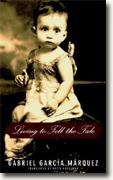Gabriel Garcia Marquez
book reviews:
· general fiction
· chick lit/romance
· sci-fi/fantasy
· graphic novels
· nonfiction
· audio books
· author interviews
· children's books @
curledupkids.com
· DVD reviews @
curledupdvd.com
newsletter
win books
buy online
links
home
for authors
& publishers
for reviewers

 |
Living to Tell the Tale Gabriel Garcia Marquez Knopf Hardcover 496 pages November 2003 |
|
In my misspent youth I imprinted on the prose of Gabriel Garcia Marquez. For a magical season, I lived within the pages of One Hundred years of Solitude. I could see Macondo as clearly as my own hometown. It was more than a literary vision - it was psilocybin of the mind's eye. In a more mature posture, I read Love in the Time of Cholera, still romantic enough to re-read the final chapters with tears of joy.
Referring to the poverty of his childhood, the lack of electricity for reading, and the necessity of going to school hungry, Marquez writes, "I never shared the malicious view that the patience with which my father dealt with poverty showed...irresponsibility. On the contrary: I believe these were Homeric tests of an unfailing complicity between him and his wife that allowed them to maintain courage even at the edge of the abyss." This courage I have observed in working with peasants in Africa and Latin America. Of school he says, "I had a natural instinct for predicting the important points in each subject, almost guessing the ones that most interested the teachers in order not to study the rest." His calling to be a writer, beginning with his passion for journalism, started at an early age. An indifferent student of anything but prose, he believes "what saved me were my unexpected answers, my lunatic notions, my irrational inventions." Throughout these recollections is the repetition of the tale of selling the house, and his mother's plaint, "So what shall I tell your papa?" and Marquez's response, "Tell him I love him very much and thanks to him I'm going to be a writer." When he sees his first published piece, he speaks of reading it "hiding in my room, my heart pounding...I was discovering the crushing power of print." Every new writer knows this experience, something between egoistic pride and justifiable, timeless awe. There is a problem with writing an autobiography in the style of Gabriel Garcia Marquez, even if you happen to be Gabriel Garcia Marquez, that leaves it open to criticism even if you happen to be an admirer of Gabriel Garcia Marquez. One looks for a timeline - when did he publish his first novel, and the next, and how did that dovetail with real events in the world, a great wide world to which, surely, he had access after gaining fame? The autobiography seems mired in the mud of Macondo, touched with the same brush that kept his novels in a world apart. To say it's hard to read would be untrue - nothing Marquez writes can be hard to read, but you have to suspend your hard-won belief in the intractability of factual reality in order to read what is presumably a book of fact. This work is meant as the first of three volumes. Marquez was born in 1927. His output has been prolific and tirelessly, seamlessly rich in image and a fabulous blending of fact and fantasy. One hopes he lives to create parts two and three. What will become of his relationship with Mercedes Barcha, "slim and distant, like a statute seated in the doorway," after he swears that if he doesn't receive a reply to his formal letter, he will go to Europe forever. In the last sentence we learn that "I found her letter of reply." © 2003 by Barbara Bamberger Scott for Curled Up With a Good Book |
| Other books by Gabriel Garcia Marquez: |
|
|
|
 Click here to learn more about this month's sponsor! |
|
| fiction · sf/f · comic books · nonfiction · audio newsletter · free book contest · buy books online review index · links · · authors & publishers reviewers |
|
| site by ELBO Computing Resources, Inc. | |
 I knew when I began the first sentence of the first chapter of Living to Tell the Tale - "My mother asked me to go with her to sell the house" - that Marquez had written no ordinary autobiography. Splashed with color like the "little fairytale houses painted in primary colors," the landscape of the train ride with his mother moves inexorably toward "the only banana plantation that had its name written over the gate: Macondo."
I knew when I began the first sentence of the first chapter of Living to Tell the Tale - "My mother asked me to go with her to sell the house" - that Marquez had written no ordinary autobiography. Splashed with color like the "little fairytale houses painted in primary colors," the landscape of the train ride with his mother moves inexorably toward "the only banana plantation that had its name written over the gate: Macondo."